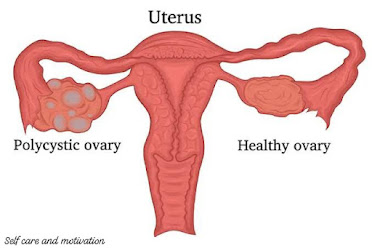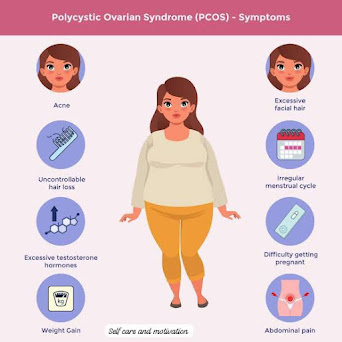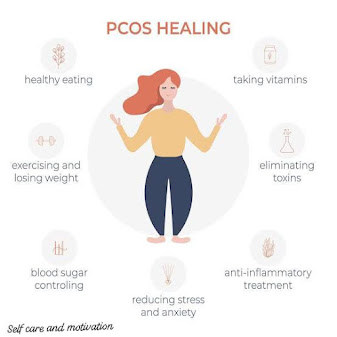Title: Understanding PCOS: Symptoms, Causes, and Management
Introduction:
Polycystic ovary syndrome (PCOS) is a common hormonal disorder affecting millions of women worldwide and can have a significant impact on their overall well-being. It is a condition characterized by various symptoms and can have a significant impact on a woman's overall health and quality of life. In this blog post, our mission is to provide you with the most comprehensive guide to managing PCOS, empowering you to take control of your health and live a fulfilling life.
What is PCOS?
PCOS is a complex hormonal disorder that affects the reproductive system and hormonal balance in women. It is characterized by the presence of multiple cysts on the ovaries, irregular menstrual cycles, and elevated levels of androgen hormones (such as testosterone). PCOS can disrupt the ovulation process, leading to fertility issues.
Symptoms of PCOS:
The symptoms of PCOS can vary from woman to woman, and not all individuals will experience the same set of symptoms. Some common signs and symptoms of PCOS are:
a) Irregular menstrual cycles:
Women with PCOS often have irregular or absent menstrual periods. This irregularity can make it challenging to predict ovulation and plan for pregnancy. women may have fertility or infertility problems.
b) Excessive hair growth:
Elevated levels of androgen hormones can cause excessive hair growth on the face, chest, back, or other areas of the body (hirsutism).
c) Acne and oily skin:
PCOS can contribute to the development of acne and excessive oiliness of the skin.
d) PCOS and Weight gain:
Many PCOS women struggle with weight gain or find it difficult to lose weight and some women experience with PCOS and weight loss. This can further exacerbate hormonal imbalances and insulin resistance.
e) Mood swings and depression:
The hormonal imbalances associated with PCOS can impact a woman's emotional well-being, leading to mood swings and an increased risk of depression.
Causes of PCOS:
The exact cause of PCOS is still unknown, but several factors can contribute to its development, including:
a) Insulin resistance:
Insulin resistance occurs when the body's cells become less responsive to the effects of insulin, leading to increased insulin production. This elevated insulin level can stimulate the ovaries to produce more androgen hormones, disrupting the normal hormonal balance.
b) Hormonal imbalance:
PCOS is characterized by imbalances in various hormones such as estrogen, progesterone, and testosterone, including elevated levels of androgens and luteinizing hormone (LH) and reduced levels of follicle-stimulating hormone (FSH).
c) Genetics:
There appears to be a genetic component to PCOS, as it tends to run in families. However, specific genes responsible for the condition have not yet been identified.
Managing PCOS:
While there is no cure for PCOS, there are several strategies that can help manage the symptoms and improve overall health:
a) Lifestyle modifications:
A healthy lifestyle is crucial in managing PCOS. Regular exercise, a balanced diet, and weight management can help improve insulin sensitivity, regulate menstrual cycles, and reduce the severity of symptoms.
b) Medications:
Depending on the individual's symptoms and goals, medications may be prescribed to regulate menstrual cycles, reduce excessive hair growth, and address other symptoms. These may include hormonal contraceptives, anti-androgen medications, or medications to induce ovulation.
c) PCOS and Fertility treatments:
For women trying to conceive, fertility treatments such as ovulation induction or In vitro fertilization (IVF) may be recommended. IVF pregnancy.
d) Emotional support:
Dealing with the emotional challenges of PCOS is essential. Seeking support from healthcare professionals, joining support groups, or talking to a therapist can help in coping with the psychological aspects of the condition.
Empowering Yourself: Resources and Support
Knowledge is power when it comes to managing PCOS effectively. Here are some valuable resources and support networks to help you along your journey:
Educational Websites and Blogs:
Stay informed about the latest research and developments in PCOS management through reputable websites and blogs. Consult your doctor or search for PCOS specialist near me or fertility clinic near me. Certain websites and blogs offer a wealth of information and resources, covering various aspects of PCOS and its management.
Support Groups and Communities:
Connect with others who are facing similar challenges by joining PCOS support groups or online communities. Sharing experiences, advice, and encouragement can provide immense support and motivation.
Conclusion:
In conclusion, managing PCOS requires a comprehensive and personalized approach. While its exact cause remains unknown, understanding the symptoms, causes, and management options can empower individuals to take control of their health. By adopting a healthy lifestyle, seeking medical interventions when necessary, and seeking emotional support, women with PCOS can effectively manage their condition and lead fulfilling lives. Remember, early diagnosis and intervention play a crucial role in minimizing the impact of PCOS on fertility and overall well-being.






0 Comments